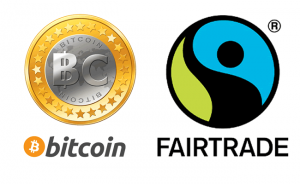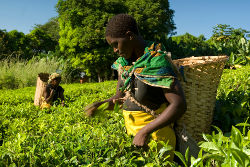Could Bitcoin really be an alternative to Fairtrade?
With it being Fairtrade Fortnight this week, Fairtrade is in the news at the moment. Another hot topic over the last few months has been Bitcoin. Incase you didn’t know Bitcoin is a cryptocurrency which is a peer-to-peer payment system often seen as a new kind of currency. To process Bitcoin transactions, a procedure called “mining” takes place, which involves a computer solving a difficult mathematical problem with a 64-digit solution, for each problem solved one block of Bitcoins is processed and the miner is rewarded with new Bitcoins.
Bitcoin has been in the news recently due to it’s huge rise in value, in February 2010 one Bitcoin was worth less than half a penny, in December 2013 it’s value peaked at over £600 for one Bitcoin. Most of the headlines have been around the meteoric rise in value, there is a story of someone using 10,000 Bitcoins to buy 2 pizzas (eeek!) back in 2010, however there is much more to it than that, many see it as potentially shaking up the entire financial system. Bitcoin gives the potential of transferring funds and paying for goods with low transaction costs, particularly for international transactions. Good or bad thing, what it can potentially do is potentially bypass the banking system.
 So what has this got to do with Fairtrade? Well I read an article on Townhall.com by Joseph Diedrich suggesting it as an alternative to Fairtrade. The article takes a two pronged criticism of Fairtrade to propose how Bitcoin could fulfill the same role.
So what has this got to do with Fairtrade? Well I read an article on Townhall.com by Joseph Diedrich suggesting it as an alternative to Fairtrade. The article takes a two pronged criticism of Fairtrade to propose how Bitcoin could fulfill the same role.
Firstly ‘Access’, the criticism of the Fairtrade model is that producers need to become certified and that this is only granted to producers who ‘satisfy rigid requirements’ claiming that small disadvantaged producers struggle to get certification. The argument for Bitcoin is that it could give the producers power and let them communicate and trade directly with consumers “Bitcoin can be sent directly from a coffee shop in Seattle to a farmer in Columbia with the click of a button”
Whilst I am certainly very enthusiastic myself with Bitcoin and it’s potential, the argument is too simplistic to ‘replace’ Fairtrade. Firstly the problem Fairtrade is addressing is far more than anything an easy transaction route could solve. The ‘rigid requirements’ are there for a reason, such as fair labour practices, environmental sustainability and worker safety, not just the price paid. Secondly to claim that a coffee shop in Seattle could simply order form a farmer in Columbia isn’t that simple. If we ignore the present practicalities Bitcoin not actually being that easy to get your head around, I myself have purchased some (sadly not when they were worth half a penny!) and it took a bit of time and research to do, as well as a UK bank account to transfer money to get the Bitcoins, not something I could see many farmers having easy access to. Assuming these problems are overcome as the currency develops, there is still the same problem, the farmer would still need to transport the goods, so will still be at the mercy of the buyers who can transport it and effectively command the price. The farmer would not simply be able to cut out the entire supply chain and offer to sell direct, so actually the coffee shop would be buying from the same suppliers regardless.
The second argument of the article is on price and demand. Certified producers are guaranteed a minimum (above market) price for their goods. The article then claims whenever the price of a good is artificially raised above its market level it cuts demand and sustains uncompetitive farmers holding back diversification and mechanization. Well in a ‘perfect market’ where there are an unlimited number of buyers and sellers this is true, in the real world however it is not. The problem which faces farmers is that this is certainly not the case, there are organisations with market power, for example the supermarkets over here, who because of their market power can demand to pay less, in the origin country there are only a limited number of buyers who will buy produce and transport it, meaning they have market power and can push the price below what it would be in an ‘efficient’ market. Fairtrade does push the price up but it is actually pushing it up to potentially what it would be in this theoretical perfect market and therefore ensures a price which is sustainable.
The argument that Bitcoin could solve this by lowering transaction costs completely ignores the whole existing infrastructure, yes it can take away the charges banks and card companies add but this is simply not what he problem is, the problem is transporting the goods and supplying them in the country they are to be sold in, this simply wouldn’t change, it would never really be just a case of clicking and buying a couple of Fairtrade products from someone else in another country. Put simply Bitcoin could certainly in theory help the Fairtrade movement, but not replace it.



Sensible response to the Bitcoin article. Nothing is ever perfect, so both the fair trade and Bitcoin systems will always have faults, but anything that is done to create a fairer system is better than nothing. I don’t agree with the notion that ‘the internet is available to everyone’ in the other article, my only point of reference is being in Africa 10 years ago, when we had to travel 30 mins into the city, and pay a huge amount to send emails. Undoubtably it has become easier, but it is not as easy as sitting in your own home on a smart phone. So it becomes a burden for farmers to access the internet. Fair trade needs to keep doing the good work!!
Thank you for reading my article. While I don’t necessarily agree with all your points, I appreciate the thoughtful arguments. This will challenge me to think even more about the issue. Cheers!
I agree that access to currency exchange and free-flow of money is not the key issue with fairtrade. What producers need is not only the guaranteed price, but also long-term trading relationships which will continue to buy their produce over time without making sudden changes in the terms of the trade (as we know supermarkets routinely do). Fairtrade companies like Traidcraft also offer training and support so that producers can meet the market demands of western consumers for appropriate products, style and quality. This kind of knowledge is rarely available to remote communities. Access to markets is about so much more than just an exchange of goods and money.
Anything involving a” computer solving a difficult mathematical problem with a 64-digit solution,” lost me then. Sorry